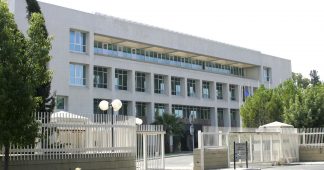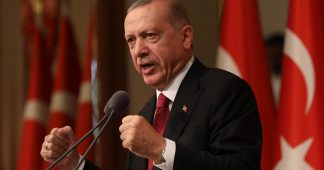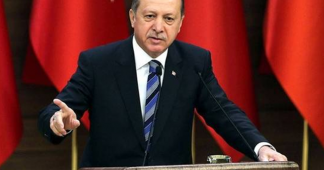By Costas Melakopides, University of Cyprus
Introduction
Recep Tayyip Erdogan’s bold political and geopolitical intentions and actions have been attracting constant international interest. This interest was lately intensified, especially during his long campaign for the June 2018 presidential and parliamentary elections. President Erdogan’s ability to inspire and fascinate his audiences and nearly half the Turkish electorate co-exists with his uncanny capacity to alienate the other half of his people, and to infuriate countless states, their leaders, and important international organizations.
Greece and the Republic of Cyprus are two states that Erdogan has failed to fascinate for some time. The Greeks of Cyprus are still suffering under the illegal and immoral occupation of 37 percent of their country sinceTurkey’s 1974 invasion.The Greeks of Greece have long been outraged:Turkey’s president has opted for aggressive rhetoric and bellicose actions, both in the Aegean Sea and in Cyprus’ Exclusive Economic Zone (EEZ), therebycombating the Greeks’ sustained efforts to cultivate harmonious relations.
In fact, Athens has long attempted to handle any bilateral Greek-Turkish problems or disputes by appealing to international law, rich cooperation in “low politics”, and cultivating authentic friendship with the Turkish people. A series of Greek prime ministers and foreign ministers, including Kostas Karamanlis, George Papandreou, Alexis Tsipras and Nikos Kotzias, have been at pains to promote mutual trust, mutual benefits and amicable neighbourly relations. Confronted, however, by Erdogan’s escalating toxic responses, it is hardly surprising that 92,5 percent of Greeks confirmed in a recent poll that they perceive Turkey as their country’s greatest threat.[1] Five weeks later, new research by “Public Issue” for Athens daily, Naftemboriki, revealed that “87 percent believe that Greece faces its biggest foreign policy obstacle with Turkey, with 79 percent saying Turkey is a threat for the country”.[2]
This essay, willindicate the grounds for the Hellenic disappointment and anger; it will sketch some of President Erdogan’s favourite methods and means in his foreign-policy decision-making; and it will analyze his and his allies’ propensity to use logical fallacies to serve their goals.
Erdogan’s controversial policies and Hellenic explanatory hypotheses
Various hypotheses are being constantly produced to explain Erdogan’s anti-Hellenic fixation. Some are resorting to his broader geopolitical ambitions, given his “megalomaniacal” declarations about the “Great Turkey” andhis statements regarding“the borders of his heart”.[3]Others concentrate on his particular anti-Greece and anti-Cyprus policies and, therefore, add supplementary explanations to the “megalomaniacal” hypothesis. Before addressing them, however, it is important to establish Erdogan’s and his associates’ recent anti-Hellenic behaviour.
As regards Erdogan’s revealing statements aiming to threaten directly and intimidate Greece and Cyprus, three should suffice for present purposes: first, his insistence in Athens, in December 2017, that the 1923 multilateral Lausanne Treaty -which fixed the two countries’ borders- should be “updated”; second, his naked threats against numerous Greek Aegean islands that Ankara has decided by fiat to label “Turkish”; and third, ad nauseam repetition that Ankara “will not tolerate unilateral actions” by the (legitimate)Cyprus government in the Cypriot Exclusive Economic Zone (EEZ). Simultaneously, Erdogan made the following macabre declaration in early 2018:[4]
Certainly we will build a great and dynamic future for Turkey, and for this we will sacrifice our life and will take the life of others when needed.
Meanwhile, Erdogan’s close advisor, Yigit Bulut, after expressing his (surrealistic) “certainty” that Washington plans to make Greece attack Turkey, asserted that since Greece “is no match for Turkey’s might”, it would be “like a fly picking a fight with a giant”.[5] Moreover, regarding the Greek Imia islets that Turkey hopes to usurp, Bulut stated last January:[6]
We will break the arms and legs of any officers, of the Prime Minister, or of any minister, who dares to step onto Imia in the Aegean.
Similarly, when a handful of isolated fascists burned a Turkish flag in Athens last March, Mustafa Deztiji, president of the extreme-right BBP –Erdogan’s expected ally in Turkey’s forthcoming presidential elections- proclaimed:
The Turkish flag one day will fly again in Athens.[7]
Indicative hostile actions include the daily violation of Greek airspace in the Aegean and the Athens FIR by armed Turkish military jets, demonstrating Ankara’s expansionist designs that disregard riskinghuman lives; the endless flights by Turkish military jets over Greek islands, often a few hundred meters above the terrified inhabitants; the constant issue of illegal NAVTEX within the Republic of Cyprus’ EEZ, aiming to disrupt Nicosia’s hydrocarbons program; the Turkish Navy’s “abortion” of gas drilling by SAIPEM 12000 in Bloc 3 of the EEZ in March 2018, violating Nicosia’s contract with Italian companyENI; the February 2018 deliberate crash of a Turkish coast guard vessel into a Greek patrol boat off Imia, ruthlessly threatening Greek sailors’ lives; and the early March 2018 theatrical arrest of two Greek military personnel who inadvertently crossed the northern Greek-Turkish border in miserable weather conditions. In June 2018, the two still remained hostages in execution of Ankara’s transparent blackmail: for the Erdogan regime has openly insinuated that the two Greeksshould be “exchanged” foreight Turkish officers who sought asylum in Greece after the July 2016 attempted coup in Turkey.
In view of such mind-boggling behavior, Greek and Greek Cypriot analysts and opinion-makers keep airing explanatory hypotheses with particular “Greek content”. Inter alia, they argue that Erdogan’s verbal and non-verbal actions, while certainly prompted by his passionate pursuit of electoral victory in June 2018, target primarily their two countries because oftheir assumedinferior military strength; that they have encouraged his aggressiveness by their traditional option for appeasement and their illusion that “Europeanization” would tame Turkey’s bellicose circles; that threatening both countries in these ways -including gunboat diplomacy- will either lead to their “Finlandization” or force them to “negotiate” under the barrel of the gun; and that, given apparently impressive hydrocarbon deposits in Cyprus’ EEZ, Turkey feels it must usurp themthrough power politics andunder false pretenses.
Erdogan’s Foreign Policy Methods Start Being Condemned
The above laconic intimations of Erdogan’s Geopolitical Theatre of the Absurd have hinted at some of Ankara’s favorite methods and means: threats to use force, bullying, open blackmail, actual use of military force, all meant to cause intimidation; but also offensive verbal attacks, demands for “updating” international treaties, and “megalomaniacal” declarations that include both concrete and ambiguous threats. These methods and means have begun being noted by the international community. Most remarkable were the Conclusions of the European Council of 22 March 2108 which included the following: [8]
- The European Council strongly condemns Turkey’s illegal actions in the Eastern Mediterranean and the Aegean and underlines its full solidarity with Cyprus and Greece.13. Recalling its Conclusions of October 2014 and the Declaration of 21 September 2005, the European Council urgently calls on Turkey to cease these actions and respect the sovereign rights of Cyprus to explore and exploit its natural resources in accordance with EU and International law.14. In this context, it recalls Turkey’s obligation to respect International Law and good neighborly relations, and normalize relations with all EU Member States including the Republic of Cyprus.
Needless to say, Greeks and Greek Cypriots were relieved that, at long last, the European Union reacted toAnkara’s belief that it can violate international legal norms and ethical values with impunity. Progressively,various capitals and other institutions are alertedto Erdogan’s arrogance and bellicosity, fearing serious threatsto regional peace and international security.
On the other hand, what we are still missing is an academic investigation of Erdogan’s repertoire of controversial methods, means and ruses used in his foreign-policy decision-making. The present discussion will contributetowardsrectification by concentrating primarily on the use of logical fallacies.
Before turning, however, to their examination, I wish to submit a note on another,rarely noticed, distinct Turkish “methodological” proclivity. This is Erdogan’s and Ankara’s skillful use of “strepsodikia”–Greek for chicanery or pettifoggery – that is, the tendency to twist and distort historical, legal, political, and geopolitical arguments and facts to serve populist and chauvinistic goals.[9] For instance, Turkey has been using strepsodikia to deepen international confusion on the real nature of the Cyprus problem. Erdogan and his ministers resort to conceptual distortion and legalistic manipulation, presenting Turkey’s illegal and immoral policies as paradigms of morality and legality and claiming to represent “the equal rights” of the “Turkish Republic of Northern Cyprus”. In reality, this occupied territory is, according to the European Court of Human Rights, a “puppet state” and illegal appendix to the Republic of Turkey, that has been forcefully condemned by UN Security Council Resolutions 541(1983) and 550 (1984). Hence no country in the world has recognized it, except for Turkey!
Intentional Use of Logical Fallacies
All the “methods” mentioned already imply Ankara’s entrenched decision to use even illegal and immoral methods and means to achieve its expanding political and international geopolitical ambitions.[10]Our discussion will now focus on a central dimension of Erdogan’s methodological repertoire that has escaped “academic” attention: namely the employment of logical fallacies which constitute serious violations of the universal Rules of Logic.
An outstanding recent case involved Turkey’s EU Affairs Minister Omer Celik. On 6 June 2018, he “slammed” a Netherlands mayor for granting permission to a group to roast pork in front of a mosque during iftar (the fast-breaking meal):[11]
“On Thursday, at the time of the breaking of Ramadan fast, members of this fascist organization will hold a barbeque party in front of Rotterdam’s Laleli Mosque of Islamitische Stichting Nederland and they will roast pigs on spits”, Celik tweeted.
Omer Celik is well-known to international media for “slamming” persons, states and institutions. In addition, he usually complains, protests, or expresses surprise at the stupidity and/or insanity of his slammed subjects. Such acts, of course, commit the logical fallacy Ad Hominem, or attack against the person (as opposed to his/her ideas). To be sure, the act in front of the Dutch mosque involved a form of provocation, since eating pork is forbidden for Muslims. But this time, Celik did not just complain. His passionate intervention involved primarilypontificating and hectoring.
Celik said this is the most immoral attempt ever in the history of hate crimes. “Granting legal permission to such an immoral activity is also another deficiency of morality”, he added.[12]
Hectoring and pontificating, of course, are simply begging the question, one of the commonest logical fallacies.[13]Minister Celik’s moralistic diatribe, however, continued on a pseudo-poetic level:
“Celik also said Turks and other Muslims in Rotterdam will lay flowers around the mosque and ‘erect a wall of love with flowers against the odor of hate’”. “Muslims will teach a humanity lesson against this policy of hatred. Thus, they will remind everyone of the respect to mosques, churches and synagogues”, he said.
The sad truth, however, is that the last statement has “the odor” of a ludicrous lie. Respect to churches and synagogues by the Erdogan regime has widely been questioned, if only because the most emblematic Church of Orthodox Christianity, Aghia Sophia, keeps being violated in various ways over the centuries. Thatit operates as a Museum from 1935 to this day has not prevented chauvinists and religious fanatics from committingfrequent politico-religious offences. Equally profound, and massive this time, is the utter violation of respect for churches in Turkey-occupied Cyprus, where churches have either been demolished or transformed into barns or bars.
In any event, Omer Celik’s last statement constitutes a glowing paradigm of non sequitur; that is, the fallacy “it does not follow”. For few people could believe that “erecting a wall of flowers” around a mosque in Rotterdam would necessarily become associated either with a broader call for respect for synagogues and churches or, for that matter, with mosques in general.
But Celik’s assertion, typical of the Erdogan regime’s propagandistic repertoire, exhibits additional fallacies. The first is the claim that “this is the most immoral attempt ever in the history of hate crimes”.However, any definition of “hate crime” essentially containsviolence. In the Rotterdam case this cannot even arise. Moreover, to call it “the most immoral attempt in the history of hate crimes” is insulting to the victims of all typical such crimes, from Ku Klux Klan’s to the Holocaust to today’s anti-Semitic violence to Caste-related violence in India. Therefore, Celik’s fake judgement is manifestly fraught with additional logical errors.
Moreover, it is disturbing to see an Ankara Minister appealing to “the history of hate crimes”, when his country has long been exterminating Kurds in South-eastern Turkey and more recently in Syria’s Afrin. For the differentia specifica in both cases is the Turkish Army’s emphatic use of violence. Analogously, the Erdogan regime is not qualified to talk of “morality” and “policies of hatred” when Turkey has been occupying over one-third of Cyprus since 1974 andis simultaneously engaged in the unending anti-Hellenic policies of intimidation intimated above. In fact, all these policies are unquestionable examples of hate crimes:beingmanifestly racist and pursued through an orchestrated synthesis of blackmail, threats, bullying and direct aggression.
Various further fallacies are also committed domestically by the Erdogan regime, the most widespread being the Ad Hominem. The attacks against thousands of people, who have been imprisoned or laid off after the attempted coup of 15 July 2016, without proof of any properly demonstrable crime -except for the subjective definitions of an authoritarian regime- are paradigm cases of Ad Hominem attacks on a massive scale.
All the Erdogan-perpetratedcrises mentioned aboveforce Ankarato employ fallacies in order to achievemisinformation viamanipulation of historical and legal facts. Given that such acts are clear examples of strepsodikia, it follows that the latter constitutes a new kind of fallacious synthesis. And since among Turkey’s main goals is its exculpation, the most obvious fallacies mobilised in all these cases are, again, Begging the Question and the fallacies of Inconsistency and Equivocation.[14]
Enter Erdogan’s Ally, Mr Devlet Bahceli
Erdogan’s presidential supporter, extreme-right-winger and leader of the Nationalist Movement Party (MHP), Devlet Bahceli, recently embarked himself on deeply uncivilized attacks against the Greeks. Preparing for the June 2018 elections, he targeted the Greek nation with banality, which revealedhis willingness to cheat byfallacious rhetoric.Bahceli’s favourite one is the facile fallacy of Red Herring. For this fallacy is committed when a statement is used to divert attention from the real issue by switching the focus to an issue of little or only tangential relevance to the real issue. Thus, during his campaign, Bahceli threatened, at least twice, to send the Greeks “to find their ancestors” at the bottom of the Aegean Sea.
More specifically, Bahceli, the “stone-faced” leader of the “Grey Wolves”, declared in what the Greeks always call Smyrna, among other things:
The Greek government, which plays games with the islands of the Aegean Sea, should learn its limits and should not forget what its ancestors went through when they were thrown to the bottom of the sea. The same will happen again. God willing, the willingness to render the Aegean once again the graveyard of the desires of the Greeks is still alive. And it will continue to be (alive) until the end”.[15]
Here, the “red herring” fallacy consists in bringing up the Smyrna tragedy for two reasons: first, in order to traumatize the Greeks deeply, because this is part of their “Asia Minor Catastrophe”; and second, to hide the absence of any argument regarding “Greek games with the Aegean islands”. Therefore, Bahceli is here also “Begging the Question”. For the truth regarding the Greek Aegean Islands is solidly established by International Law. And this was precisely the ground for the European Council’s “strong condemnation” of Turkey’s “illegal actions in the Aegean”, as we have seen.
In addition, “Bahceli’s delirium” constitutes a paradigm of irrationality, since, the same quotation above commits two additional fallacies: first, the fallacy of “False Analogy”; and second, the “Confusion of a Necessary with a Sufficient Condition”. As regards the former, the analogy is false because the Greeks are presently fully consciousof the Erdogan regime’s bellicose mood, cultivated for months for any of the aforementioned reasons. Therefore, Greece has been fortifying its Deterrence “just in case”. As for the associated second fallacy, it was committed because the existence of Turkish willingness to “render the Aegean again a Greek graveyard” is by no means sufficient for the alleged, by the leader of the “Grey Wolves”, goal or intention!
The above quotation brought Bahceli’s audience to a triumphant standing ovation, demonstrating the effects of the sustained anti-Hellenic brain-washing of the Turkish people especially during the first six months of 2018. But that reprehensible statement followed his earlier incomprehensible statement. Given that his party had just produced a short video where not only Turkey but also the Republic of Cyprus were covered with the Turkish flag; and given the angry protests that ensued in Cyprus and Greece; Bahceli expressed “surprise” at these protests:[16]
Why? Because it shows Cyprus as Turkish territory. I will ask these silly and thick-headed persons: ’what were we supposed to do?’, ‘how were we supposed to show (Cyprus)?’ I declare it and emphasize it. “Cyprus is Turkish. It is Turkish and Turkish it will remain”.
Having said enough about Bahceli’s delirium, I may only add epigrammatically that the last statement is a monument to fallacious thinking and banal politicking. For, once again, the extreme right-winger has committed a Grand Non Sequitur : for not only is Cyprus far from being “Turkish” (!) but the Republic of Cyprus is the independent state recognized by the entire world on the basis of International Law and, according to European Law, the entire Republic is a Member of the European Union, including the occupied territory.[17]
Inevitably, one is tempted to ask the following question: if Recep Tayyip Erdogan’s presidential ally is such a master of logical fallacies or, otherwise put, a proponent of passionate irrationality, what does this phenomenon imply about Erdogan’s having to resort to such an ally and, therefore, about Erdogan’s judgment?
Back to President Erdogan Himself
Before a final look at the Turkish president himself, let me record, first, that Greek Cypriot and Greek media are flooded every day, and the Television channels every evening, with Erdogan’s own performances and related news that keep astonishing the Hellenic minds. To be sure, there is almost universal agreement that the Erdoganian behaviour is “irrational” in at least some of the senses used in ordinary language and employed in the Theory of International Relations.[18] In all these senses, Erdogan’s recent behaviour constitutes the apotheosis of Hubris. What has not received as yet widespread agreement is whether Nemesis is not far behind. But the fact that Erdogan’s aggressiveness, bellicosity, his penchant for threats and blackmail, and his tireless efforts to offend and/or intimidate Cyprus, Greece, Israel, the entire Eastern Mediterranean, and beyond, until the heart of Europe, is gradually being perceived as bringing his Nemesis closer every day.
The latest, mid-June 2018, crisis erupted because of Austria’s decision to close down a number of mosques and to investigate the residence permits of 40 imams associated with these mosques.[19] After a reaction by Erdogan’s spokesman, Ibrahim Kalin, to the effect that Vienna’s decision reflects “the Islamophobic, racist and discriminatory wave” in Austria, the Turkish president took over to “slam” Austrian Chancellor, Sebastian Kurz:
“I’m making a call to the Austrian prime minister: You are still young and you need experience. Your inexperienced behaviour could cost you heavily”, Erdogan said…repeating his earlier warning that Austria’s decision “could start a crusader-crescent war”.[20]
Erdogan then added a few strange sentences, culminating in an obscure threat:
“I am also making this call to the whole West, particularly to Germany: Straighten out your man. Otherwise the situation may get out of hand. We have some steps to be taken in accordance with our arguments”, he said.[21]
The Ad Hominem slamming of the Austrian leader –by fastening on his age and ignoring his rights as elected Chancellor- is evident enough. But Erdogan is rarely satisfied with a mere “slamming”. Hence he added immediately an ambiguous threat aiming at intimidation through political-psychological bullying (“Your inexperienced behaviour could cost you heavily”.) But then, matters gotout of hand indeed: for the “warning” that Austria’s decision “could start a crusader-crescent war”, if taken in association with Erdogan’s political-Islamic fixation, his bellicose reactions to any criticism, and his passion for hectoring and pontification, constitute an explosive combination from which one cannot preclude toxic political and geo-political implications. Thus, from one more logical fallacy he moved to personal bullying and collective threats, just before the most alarming –because most ambiguous- threat of all: “We have some steps to be taken in accordance with our arguments”.
The last sentence suffers from deep ambiguity. However, in combination with the threat of a “Cross versus Crescent war”, it seems to commit the Slippery Slope fallacy, which “involves the acceptance of a succession of events without direct evidence that this course of events will happen”.[22]Erdogan, once again, instead of valid logical thinking, demonstrates his entrenched preference for passionate exaggeration of data, bellicose reactions and an apparently insatiable appetite for threats and intimidation on a massive scale.
Conclusions
The above analysis completes our survey of the intentional, for the most part, but also unintentional -because of passion, clumsiness or superficiality- employment of fallacies by Recep Tayyip Erdogan and his political associates. One main conclusion has to do with the current Turkish elite’s emerging political culture. Traditionally, this political culture was marked primarily by narcissism, aggressiveness, and megalomania, but contained also pessimism, self-doubts and insecurity.[23] What Erdogan’s “charismatic” personality and authoritarian operational code seem to have contributed is the strengthening and deepening of the first triad. Therefore, serious questions have arisen, and require urgent answers, regarding the suspected unreliability of this leader, the consequent fears about Turkey’s political and geopolitical ambitions, and the best international responses to such unbounded ambitions.
NOTES
[1] Kappa Research,shown by Alpha TV, Athens, 21 March 2018.
[2] “Majority of poll respondents say Turkey the biggest foreign threat for Greece”, www.naftemporiki.gr/printStory/1345587, 29April 2018.
[3]For Erdogan’s declaration about these borders, see Manolis Kostidis, “Erdogan spoke about the borders of his heart”, IBNA, www.balkaneu.com/erdogan-spoke-borders-heart , 27 October 2016.
[4] P. Karvounopoulos, “We will take the life of others for the great Turkey”, 24 March 2018, www.militaire.gr
[5] “Erdogan advisor says Greece ‘like a fly picking a fight with a giant’, ekathimerini.com, 14 February 2018.
[6] Ibid.
[7] “’Delirium’ by Deztiji: The Turkish flag will fly back in Athens”, onalert.gr/paralhrhma-destidzi-tourkikh-shmaia-kymatisei-3ana-a8hna/63715
[8] Council of the EU, European Council conclusions on the Western Balkans and actions by Turkey in the Eastern Mediterranean and the Aegean Sea, 22 March 2018, Press Release 164/18.
[9] For an earlier intimation of Ankara’s strepsodikia, see Costas Melakopides, “How Rational Is President Erdogan’s Policy against Cyprus and Greece: a Case Study”, in Russian International Affairs Council (RIAC) Website, 8 May 2018.
[10]For Turkey’s unbounded, even “global” ambitions, see Ahmet Davutoglu, Strategic Depth: Turkey’s International Position, (Athens: Piotita Publications, 2010) (in Greek). Intriguingly, this “megalomaniacal” book has evaded translation in major languages.
[11] See www.hurriyetdailynews.com/turkey-slams-rotterdam-mayor-for-bbq-event-near-mosque-dur…7 June 2018. “Slamming” is the term used by Hurriyet Daily News to describe Ankara’s continuous rhetorical attacks against, inter alia, the EU, the US, the UN, Germany, France, Greece, Israel, and Cyprus.
[12] Ibid.
[13]Begging the Question, we recall, occurs when someone assumes the truth of a conclusion instead of providing grounds to support it.
[14] For a useful list and explication of main Fallacies, see, for instance, the Texas State University’s Dept. of Philosophy article at www.txstate.edu/philosophy/resources/fallacy-definitions
[15] “Bahceli’s Delirium: Cyprus is Turkish and will remain Turkish”, www.sigmalive.com/news/kypriako/513481/paralirima-mpaxtselii–kypros-einai-tourkiki-am… 11 June 2018. Bahceli obviously intended to remind the Greeks of the misery that ensued the burning of Smyrna and their desperate attempt to reach boats and ships in order to cross the Aegean towards Greece.
[16] Ibid.
[17]These issues are covered in Costas Melakopides, Russia-Cyprus Relations: A Pragmatic Idealist Perspective (London: Palgrave, 2016), Chapter 2, 14-30.
[18] For a schematic discussion of various senses of “rational” and “rationality”, see my RIAC paper as in Note 9 above.
[19] Murat Yetkin, “’Cross vs. Crescent’ again? Seriously?” www.hurriyetdailynews.com/opinion/murat-yetkin/cross-vs-crescent-again-seriously-133156, 12 June 2018.
[20] Ibid.
[21] Ibid.
[22]As Note 14 above.
[23] See Costas Melakopides, “Turkey’s Political Culture as a Necessary Condition for Decoding Its Policies Toward Cyprus, Greece, and the European Union”, Journal of Political and Military Sociology, Vol. 34, No.2 (Winter) 2006, 301-317.
This article was delivered for publication to the RUDN Journal of Political Science (Moscow) on 20 June 2018 and was published a few days ago.











